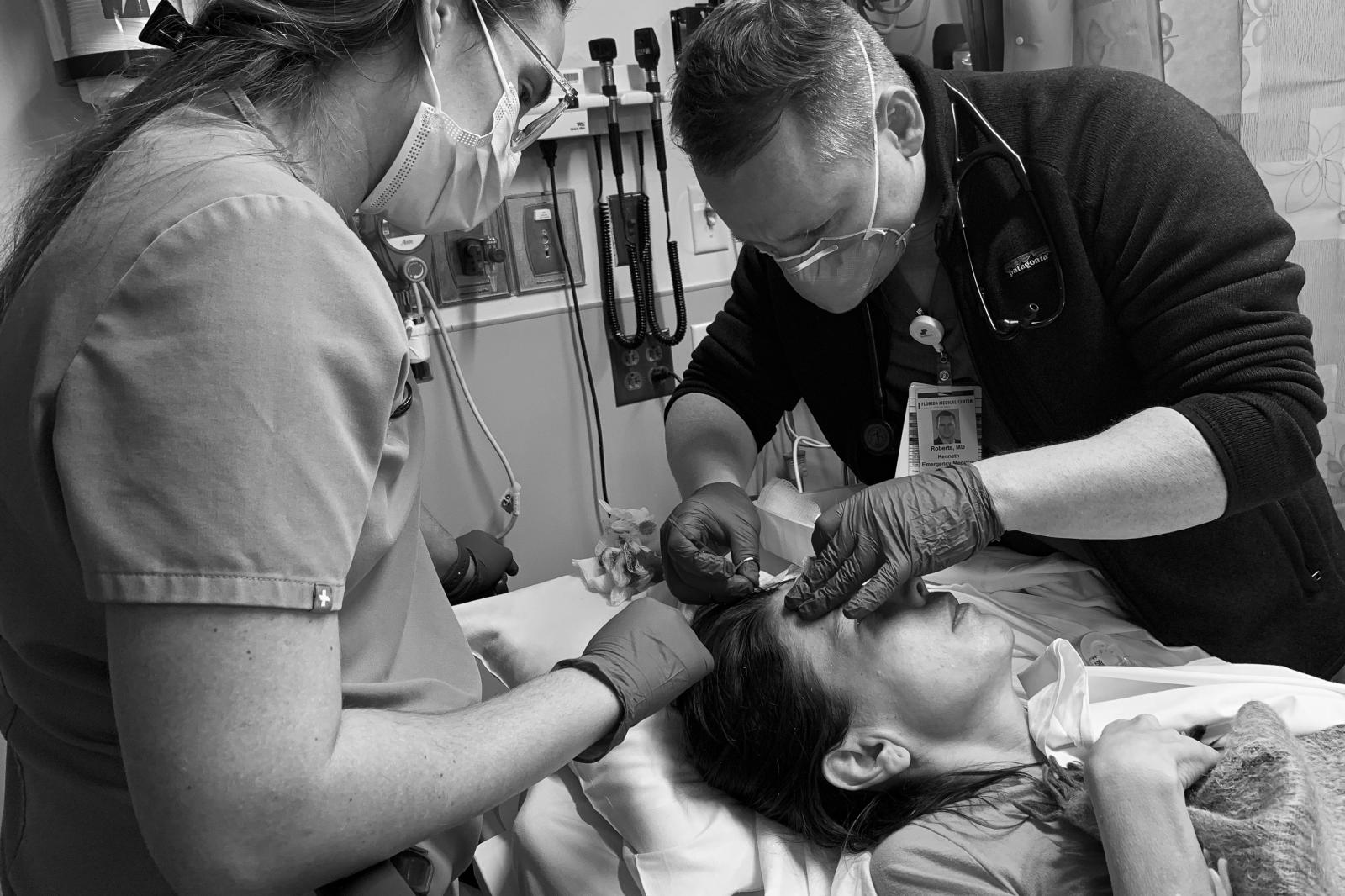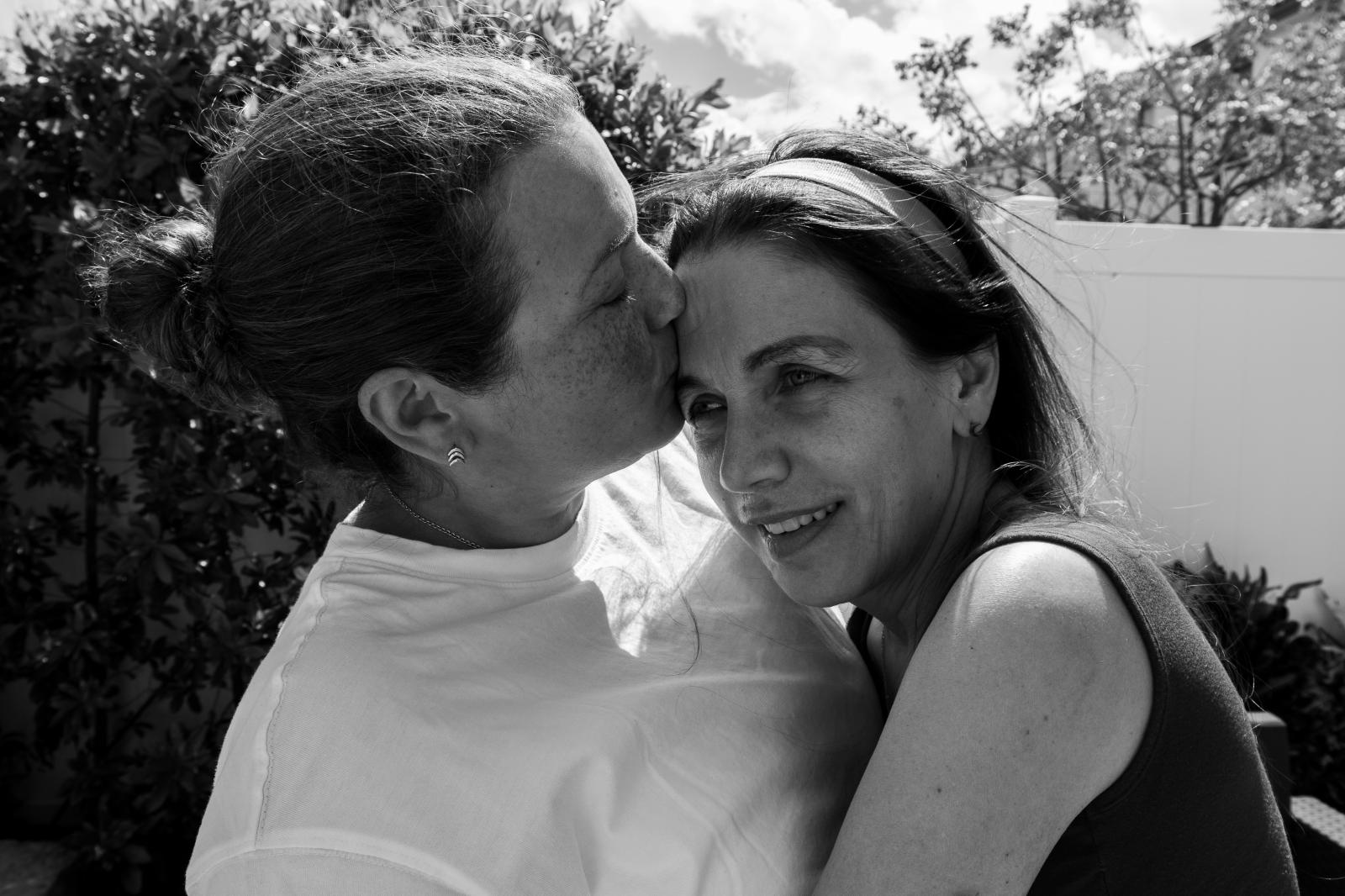The disease runs its course with as much rush as it does pain because of the old and new symptoms. Adapting and learning is the watchword of each day. Living through hard months is already a habit.
Tiredness gives her no respite and long walks are no longer an option. Now we have to make do with several short walks a day. With this disease there seems to be no respite and much less routine.
We have had to change Oralis's diet because she no longer has the ability to use cutlery, chew and swallow certain foods. The only independence left to her in this sense is one or another food that she can hold with her hands, however, she can only eat soft and easily digestible foods.
Among the most painful and frightening changes are seizures. The first time it was two episodes on the same day, needing hospitalization. That day is only comparable to the one in which we received the diagnosis and learned what FTD is and its consequences. And even though I already know what to expect, I am never prepared for something so devastating and painful.
The worry that another episode could happen and she could get hurt is a shadow that haunts me every day and from which I can't escape.
The FTD doesn't let up, but neither does loneliness. Medical visits have made me understand that there is a huge lack of knowledge about Frontotemporal Dementia in the health system and, even worse, a lack of empathy. Since when does ignorance justify indolence? Doctors and nurses alike give poor treatment to people who suffer from this disease.
Oralis has lost weight, has humor swings and mood swings, gets very exhausted and practically wants to sleep most of the day. The speed with which certain symptoms that we expected have appeared has been heartbreaking. She began to forget and confuse certain names and faces.
It is incredible what it means to meet someone and realize that even though language disorders are becoming deeper every day, a sound or a gesture is enough for me to understand her. We have always had good communication and being a talkative woman is something that has not changed. I enjoy listening to her and talking with her as much as the first time.
We spend our days between laughter and sadness, always looking for a way to make that sadness fade as quickly as possible. Yes, sometimes it is exhausting, but when I see her smile again, every effort is worth it.
She has tough and dark days, days when she feels alone, depressed and forgotten; days when she says “this was not the life I wanted”, “I just want to sleep and nothing else”, “I don't have friends anymore”.
On those dark and sad days, Bella is always by her side to fill that space, doing something that makes her smile or filling her with serenity just with her presence. Bella has been the best gift for Oralis on this horrible journey, her best companion and one of her greatest supporters. Another great support for her has been the family, who even from a distance are watching her, keeping her company, even for brief moments, moments that make her happy. In short, it is the small joys of life that make those days of fear and restlessness last as little as possible.
FTD is a disease that can be very lonely, and those who call themselves friends often disappear without realizing that Oralis, even with its limitations, is still Oralis and that a simple phone call can make a difference.
I don't know how I would have coped twenty years ago, but now social media support groups have been an important bastion of learning as Oralis continues to experience physical and emotional changes.
I have had to learn to be patient and understand every step we take, to laugh even when what I want is to cry. It hasn't been easy and I'm sure it never will be, but I have to keep going.
I feel an immense sadness and a deep pain that I don't know how to ignore. How could I, if every day that passes I am losing a piece of her, the accomplice I chose for this and every day. The pain doesn't let up either. I desperately cling to the consolation of living each day with her as if it were the first day of our lives; making her happy, laughing together and giving her everything she needs to make her feel comfortable and happy.
This journey that we did not want to start does not stop. Oralis continues to fight for her and against her. I fight for her, for Bella and to keep the end of this trip at bay, because I already know how it is and I swear I don't want to live it.
La enfermedad sigue su curso con tanta prisa como dolor a causa de los síntomas anteriores y los nuevos. Adaptarse y aprender es la consigna de cada día. Vivir meses duros ya es una costumbre.
El cansancio no le da tregua y los paseos largos ya no son una opción. Ahora debemos conformarnos con varias caminatas cortas al día. Con esta enfermedad parece no haber treguas y mucho menos rutinas.
Hemos tenido que modificar la alimentación de Oralis porque ya no tiene la capacidad de usar cubiertos, masticar y tragar ciertos alimentos. La única independencia que le queda en este sentido es uno que otro alimento que pueda sostener con sus manos, sin embargo, solo puede ingerir alimentos blandos y de fácil digestión.
Entre los cambios más dolorosos y aterradores están las convulsiones. La primera vez fueron dos episodios en el mismo día, hasta el punto de necesitar hospitalización. Ese día solo se compara a aquel en el que recibimos el diagnostico y conocimos lo que es el FTD y sus consecuencias. Y aunque ya sé qué esperar, nunca estoy preparado para algo tan devastador y doloroso.
La preocupación de que pueda ocurrir otro episodio y resultar lastimada es una sombra que me persigue cada día y de la que me es imposible escapar.
El FTD no da tregua, pero la soledad tampoco. Las visitas médicas me han hecho entender que en el sistema de salud hay un desconocimiento enorme sobre la Demencia Frontotemporal y, peor aún, falta de empatía. ¿Desde cuando la ignorancia justifica la indolencia? Médicos y enfermeras por igual brindan un trato poco adecuado a personas que sufren de esta enfermedad.
Oralis ha perdido peso, tiene alteraciones del humor y cambios repentinos del estado anímico, se agota mucho y prácticamente quiere dormir la mayor parte del día. La velocidad con la que han aparecido ciertos síntomas que esperábamos ha sido desgarradora. Comenzó a olvidar y confundir ciertos nombres y rostros.
Es increíble lo que significa conocer a alguien y darte cuenta que aun cuando los trastornos del lenguaje se hacen cada día más profundos, con un sonido o un gesto me basta para comprenderla. Siempre hemos tenido una buena comunicación y ser una mujer conversadora es algo que no ha cambiado. Disfruto escucharla y conversar con ella tanto como la primera vez.
Pasamos los días entre risas y tristezas, siempre buscando la manera que esa tristeza se diluya lo más rápido posible. Sí, en ocasiones es agotador, pero cuando vuelvo a ver su sonrisa cada esfuerzo vale la pena.
Ella tiene días duros y oscuros, días en lo que se siente sola, deprimida y olvidada; días en los que dice “esta no era la vida que quería”, “solo quiero dormir y más nada”, “ya no tengo amigos”.
En esos días oscuros y tristes, Bella está siempre a su lado para llenar ese espacio, haciendo algo que le saca una sonrisa o llenándola de serenidad tan solo con su presencia. Bella ha sido el mejor regalo para Oralis en este horrible viaje, su mejor compañera y uno de sus grandes apoyos. Otro gran apoyo ha sido la familia, que aun desde la distancia están pendientes de ella, haciéndole compañía, aunque sea por momentos breves, momentos que la hacen feliz. En fin, son las pequeñas alegrías de la vida las que hacen que esos días de espanto y desasosiego duren lo menos posible.
FTD es una enfermedad que puede ser muy solitaria, y que aquellos que se hacían llamar amigos suelen desaparecer sin comprender que Oralis, aun con sus limitaciones, sigue siendo Oralis y que una simple llamada telefónica puede ayudar mucho.
No sé cómo habría navegado estas circunstancias hace veinte años, pero ahora los grupos de apoyo en redes sociales han sido un bastión importante de aprendizaje mientras Oralis sigue experimentando cambios físicos y emocionales.
He tenido que aprender a ser paciente y a entender cada paso que damos, a reír aun cuando lo que quiero es llorar. No ha sido fácil y estoy seguro que nunca lo será, pero me toca seguir adelante.
Siento una tristeza inmensa y un dolor profundo que no sé cómo ignorar. Cómo podría, si cada día que pasa voy perdiendo un pedazo de ella, la cómplice que elegi para este y todos los días. El dolor tampoco da tregua. Me aferro desesperadamente al consuelo de vivir cada día junto a ella como si fuera el primer día de nuestras vidas; haciéndola feliz, riendo juntos y dándole todo lo que necesita para que se sienta cómoda y contenta.
Este viaje que no quisimos comenzar no se detiene. Oralis sigue luchando por ella y contra ella. Yo lucho por ella, por Bella y por mantener a raya el fin de este viaje, porque ya sé cómo es y les juro que no quiero vivirlo.























